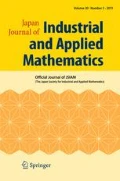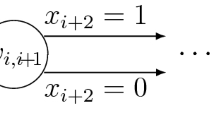Abstract
Two sets of numbers are generated to determine the feasibility and periodicity for an equality-constraint knapsack problem. By aid of the two sets, it is shown that for only a finite number of right hand side numbers the knapsack problem is hard. A novel method is given for solving such hard knapsack problems, of which the complexities of a main part does not depend on the number of variables involved, provided that the constraint coefficients are bounded. A method for representing all the optimal solutions of the knapsack problem for all right hand side numbers is further shown. A similar theory is also developed for an equality-constraint integer linear program with mixed signs in the constraint coefficients.
Similar content being viewed by others
References
A. Bachem and R. Schrader, Minimal inequalities and subadditive duality. SIAM J. Control Optim.,18 (1980), 437–443.
A. Brauer and J. E. Shockley, On a problem of Frobenius. J. Reine Angew. Math.,211 (1962), 215–220.
V. Chvátal, Hard knapsack problems. Oper. Res.,28 (1980), 1402–1411.
E. W. Dijkstra, A note on two problems in connexion with graphs. Numer. Math.,1 (1959), 269–271.
P. C. Gilmore and R. E. Gomory, The theory and computation of kanpsack functions. Oper. Res.,14 (1966), 1045–1074.
R. E. Gomory, On the relation between integer and non-integer solution to linear programs. Proc. Nat. Acad. Sci. U.S.A.,53 (1965), 260–265.
R. E. Gomory, Some polyhedra related to combinatorial problems. Linear Algebra Appl.,2 (1969), 451–558.
G. A. Gorry and J. F. Shapiro, An adaptive group theoretic algorithm for integer programming problems. Management Sci.,17 (1971), 285–306.
G. A. Gorry, W. D. Northup and J. F. Shapiro, Computational experience with a group theoretic integer programming algorithm. Math. Programming,4 (1973), 171–192.
R. Guy, Unsolved Problems in Intuitive Mathematics. Springer-Verlag, New York, 1981.
Y. Hayashi, Fundamentals of Integer Linear Programming. Ph. D. Thesis, Univ. Rochester, 1983.
Y. Hayashi, Construction of theF-, P- andK-trees of a knapsack problem and their computational experiments (in Japanese). J. Oper. Res. Soc. Japan,28 (1985), 213–240.
K. E. Kendall and S. Zionts, Solving integer programming problems by aggregating constraints. Oper. Res.,25 (1977), 346–351.
E. L. Lawler, Combinatorial Optimization Networks and Matroids. Holt, Rinehart and Winston, 1976.
M. J. Magazine, G. L. Nemhauser and L. E. Trotter, When the greedy solution solves a class of knapsack problems. Oper. Res.,23 (1975), 207–211.
R. R. Meyer, On the existence of optimal solutions to integer and mixed-integer programming problems. Math. Programming,7 (1974), 223–235.
I. Niven and H. S. Zuckerman, An Introduction to the Theory of Numbers. Third Ed. John Wiley and Sons Inc., New York, 1972.
A. Nijenhuis, A minimal-path algorithm for the “money changing problem”. Amer. Math. Monthly,86 (1979), 832–835.
J. F. Shapiro, Dynamic programming algorithms for the integer programming problem-I: the integer programming problem viewed as a knapsack type problem. Oper. Res.,16 (1968), 103–121.
J. F. Shapiro, Group theoretic algorithms for the integer programming problem-II: extensions to a general algorithm. Oper. Res.,16 (1968), 928–947.
Author information
Authors and Affiliations
About this article
Cite this article
Hayashi, Y. A solution method for a knapsack problem and its variant. Japan J. Appl. Math. 3, 73–91 (1986). https://doi.org/10.1007/BF03167093
Received:
Revised:
Issue Date:
DOI: https://doi.org/10.1007/BF03167093



